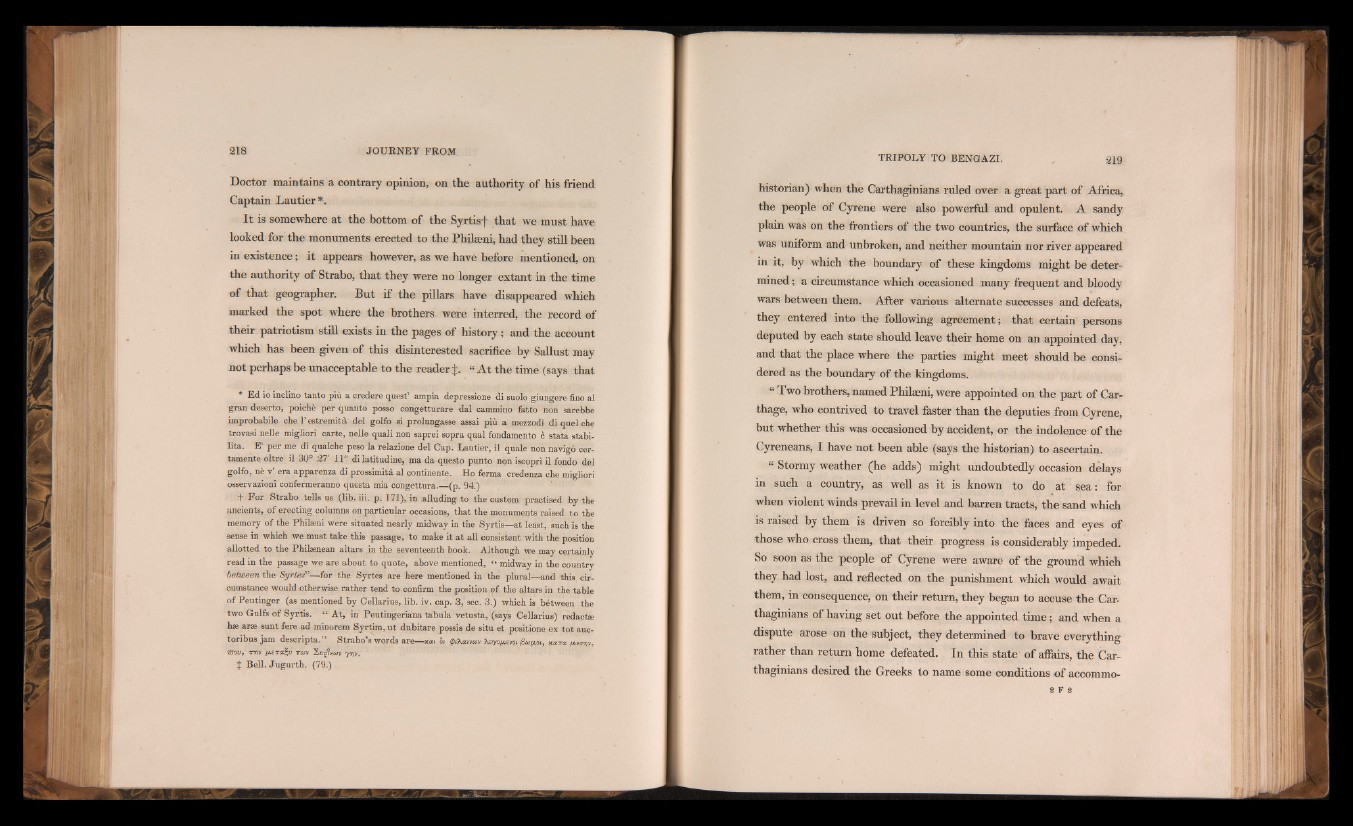
Doctor maintains a contrary opinion, on the authority of his friend
Captain Lautier*.
It is somewhere at the bottom of the Syrtisf that we must have
looked for the monuments erected to the Philaeni, had they still been
in existence ; it appears however, as we have before mentioned, on
the authority of Strabo, that they were no longer extant in the time
of that geographer. But if the pillars have disappeared which
marked the spot where the brothers were interred, the record of
their patriotism still exists in the pages of history ; and the account
which has been given of this disinterested sacrifice by Sallust may
not perhaps be unacceptable to the reader ijs “ At the time (says that
* Ed io inclino tanto più a credere quest’ ampia depressione di suolo giungere fino al
gran deserto, poiché per quanto posso congetturare dal cammino fatto non sarebbe
improbabile che l’estremità del golfo si prolungasse assai più a mezzodì di quel che
trovasi nelle migliori carte, nelle quali non saprei sopra qual fondamento è stata stabilita.
E' per me di qualche peso la relazione del Cap. Lautier, il quale non navigò certamente
oltre il 30° 27 11" di latitudine, ma da questo punto non iscoprì il fondo del
golfo, ne v. era apparenza di prossimità al continente. Ho ferma credenza che migliori
osservazioni'confermeranno questa mia congettura (p. 94:)
1" For Strabo tells us (lib. iii. p. 171), in alluding to the custom practised by the
ancients, of erecting columns on particular occasions, that the monuments raised to the
memory of the Philaeni were situated nearly midway in the Syrtis—at least, such is the
sense in which we must take this passage, to make it at all consistent with the position
allotted to the Philaenean altars fn the seventeenth book. Although we may certainly
read in the passage we are about to quote, above mentioned, “ midway in the country
between the Syrtes”—for the Syrtes are here mentioned in the plural—and this circumstance
would otherwise rather tend to confirm the position o f the altars in the table
of Peutinger (as mentioned by Cellarius, lib. iv. cap. 3, sec. 3.) which is bétween the
two Gulfs of Syrtis. “ At, in Pentingeriana tabula vetusta, (says Cellarius) redactse
hse arse sunt fere ad minorem Syrtim, ut dubitare possis de situ et positione ex tot auc-
toribus jam descripta. Strabo’s words are— x a u h i jp iX a i v w v \E<yo//,Evoi i , ¡ t a r a /jiea y iv ,
ZSOU, T7ÌV /J,ETCtZ;V TÙJV %0(fleCJV y v tv .
J Bell. Jugurth. (79.)
historian) when the Carthaginians ruled over a great part of Africa,
the people of Cyrene were also powerful and opulent. A sandy
plain was on the frontiers of the two countries, the surface of which
was uniform and unbroken, and neither mountain nor river appeared
in it, by which the boundary of these kingdoms might be determined
; a circumstance which occasioned many frequent and bloody
wars between them. After various alternate successes and defeats,
they entered into the following agreement; that certain persons
deputed by each state should leave their home on an appointed day,
and that the place where the parties might meet should be considered
as the boundary of the kingdoms.
“ Two brothers, named Philaeni, were appointed on the part of Carthage,
who contrived to travel faster than the deputies from Cyrene,
but whether this was occasioned by accident, or the indolence of the
Cyreneans, I have not been able (says the historian) to ascertain.
“ Stormy weather (he adds) might undoubtedly occasion delays
in such a country, as well as it is known to do at sea: for
when violent winds prevail in level and barren tracts, the sand which
is raised by them is driven so forcibly into the faces and eyes of
those who cross them, that their progress is considerably impeded.
So soon as the people of Cyrene were aware of the ground which
they had lost, and reflected on the punishment which would await
them, in consequence, on their return, they began to accuse the Carthaginians
of having set out before the appointed time; and when a
dispute arose on the subject, they determined to brave everything
rather than return home defeated. In this state of affairs, the Carthaginians
desired the Greeks to name some conditions of accommos
f s